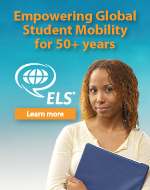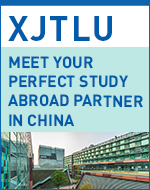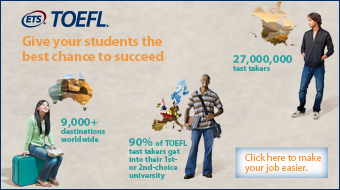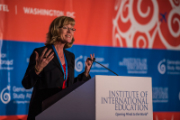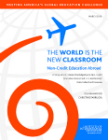 |
March 30, 2016
|
 |
|
News
Submission Deadline: April 29, 2016
As new media continues to shape today’s academic experiences, so too has it found a place in the world of international education. The idea of virtual exchange has become a reality for countless institutions around the world, and continues to gain momentum as we see how it can provide deep and interactive learning experiences. These exchanges are technology-enabled programs allowing for the sustained sharing of ideas through a people-to-people education approach.
The reported benefits and teachings from the use of virtual exchange have been numerous. For students who may not have the ability to travel internationally, it is a gateway to another culture and helps them to succeed as global citizens in an increasingly interdependent world. In the 21st century, these cross-cultural skills are vital to personal and professional success, and virtual exchanges can connect peers across continents in an effort to achieve this shared goal.
The purpose of this issue of the IIENetworker magazine is to delve deeper into the ever-evolving landscape of virtual exchange in order to explore, share and continue the dialogue around this emerging educational model. As we look to submissions for the upcoming issue, please consider some of the following topics:
• Best practices in supporting and administering virtual exchange programs at various education levels.
• Use of new and/or innovative platforms & programs to conduct virtual exchange, which may include case studies
focusing on current or past projects and their overall impact.
• A look into the changing landscape of virtual exchange and what we might expect in the years to come. Is there
potential for this type of exchange to replace in-person programs or work alongside them?
• Virtual exchange in conflict zones or in areas where traditional in-person exchange may not be feasible.
If you are interested in submitting an article for the fall 2016 issue of IIENetworker please let us know as soon as possible. Submissions are due by April 29, 2016 and should be between 1000 and 1500 words. Address all inquiries to Courtney Lind at clind@iie.org and for more information on IIENetworker, please visit: www.iie.org/iienetworker.
Publications
In the recent IIENetworker magazine, Columbia University’s Anne B. Waters gives specific advice on how to build faculty engagement in campus internationalization. In addition to encouraging faculty to pursue international grant and fellowship opportunities for research, she also advises campuses to design "programs and policies to involve faculty in the university’s international strategy at each stage of their career, from recruitment to retirement."
Events & Deadlines
Registration Deadline: May 30 | September 13-16, 2016 | Liverpool, England | More Information | Contact
EducationUSA will host a pavilion at the European Association for International Education Conference (EAIE) and will provide space for accredited U.S. higher education institutions. This is an excellent opportunity to showcase your institution and especially to build partnerships with institutions in Europe and other world regions. With Erasmus+ funding available for short-term exchange programs, meeting colleagues from European institutions is easy at EAIE, which reaches more than 5,000 higher education professionals from over 90 countries, including 600 exhibitors. You can choose from more than 200 sessions and workshops and about 20 networking events.
Fulbright
The DDRA program offers doctoral students the opportunity to deepen their understanding of diverse cultures and broaden their global awareness through sustained research abroad. The Fulbright-Hays DDRA Fellowship Program provides opportunities to doctoral candidates to engage in full-time dissertation research abroad in modern foreign languages and area studies. The program is designed to deepen research knowledge and increase the study of modern foreign languages, cultural engagement and area studies not generally included in U.S. curricula. The institutional project period is 18 months. Students may request funding for a period of no less than six months and no more than 12.
Study Abroad
Partnerships
Deadline: April 29, 2016 | Questions and Submissions
The International Handbook on Comparative Studies on Community Colleges and Global Counterparts series uses comparative and empirical research to explore a complex cohort of higher educational institutions. These institutions share similarities in that they serve as a niche for post-secondary students to acquire skill-sets and credentials based on an education that offers a more advanced curriculum than secondary school and serves as a local and often lower-cost pathway that gives options for university overflow. Proposals that contribute original research and that may fit into the following themes are invited: the globally structured education agenda; international partnerships; role of the institution in the world; serving/not-serving the needs of unique populations; cultural adaptations and equity issues.
If interested, please submit to Rosalind Raby by April 29, including a chapter title, author contact details, a 500-750 word description of the chapter, and 5-10 key words. Contributors will be notified of acceptance decisions by May 9, 2016 and sent chapter format and guidelines at that time. Final chapters would be due by November 30, 2016.
Applications Deadline: May 15, 2016 | Apply
The American Institute for Contemporary German Studies is pleased to announce the continuation of its German-American youth exchange program on the theme "Immigration, Integration, and a New Transatlantic Generation." 20 young leaders with little or no experience with transatlantic relations will come together for seminars and site visited in Washington and Berlin. This innovative program will establish new connections between communities that have grown principally from an immigration background, and address common challenges of immigration and integration. Activities include a seminar and site visits in both cities over the course of 4-5 days. Selected participants are required to attend both events, the first taking place in Washington, DC from October 16-21, 2016 and the second in Berlin from May 7-12, 2017. Travel, accommodation and most meals will be provided.
Fluency in English is mandatory. Please send application materials including a CV, one-page letter of interest, and two letters of recommendation to Ms. Susanne Dieper.
|
||||||||||||
